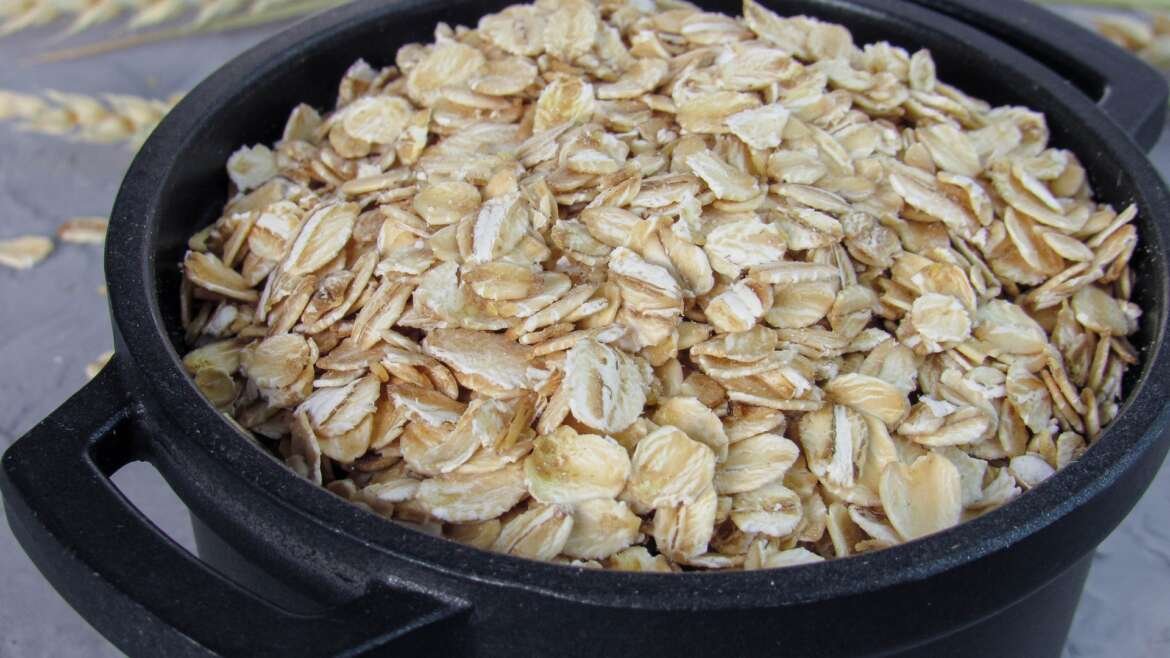

Oats are among the healthiest grains on earth. They’re a gluten-free whole grain and a great source of important vitamins, minerals, fiber, and antioxidants.
Studies show that oats and oatmeal have many health benefits. These include weight loss, lower blood sugar levels, and a reduced risk of heart disease.
Here are 7 health benefits of eating oats and oatmeal:
1. Oats are incredibly nutritious
The nutrient composition of oats is well-balanced. They are a good source of carbs and fiber, including the powerful fiber beta-glucan.
They are also a good source of high quality protein, with a good balance of essential amino acids.
Oats are loaded with important vitamins, minerals, and antioxidant plant compounds. Half a cup (78 grams) of dry oats contains:
- Manganese: 63.91% of the daily value (DV)
- Phosphorus: 13.3% of the DV
- Magnesium: 13.3% of the DV
- Copper: 17.6% of the DV
- Iron: 9.4% of the DV
- Zinc: 13.4% of the DV
- Folate: 3.24% of the DV
- Vitamin B1 (thiamin): 15.5% of the DV
- Vitamin B5 (pantothenic acid): 9.07% of the DV
- smaller amounts of calcium, potassium, vitamin B6 (pyridoxine), and vitamin B3 (niacin)
Oats have 51 grams of carbs, 13 grams of protein, 5 grams of fat, and 8 grams of fiber in 1 cup. This same serving has only 303 calories.
This means that oats are among the most nutrient-dense foods you can eat.
2. Whole oats are rich in antioxidants, including avenanthramides
Whole oats are high in antioxidants and beneficial plant compounds called polyphenols. Most notable is a unique group of antioxidants called avenanthramides, which are almost solely found in oats.
Both old and newer research has found that avenanthramides may help lower blood pressure levels by increasing the production of nitric oxide. This gas molecule helps dilate (widen) blood vessels and leads to better blood flow.
In addition, avenanthramides have anti-inflammatory and anti-itching effects
3. Oats contain a powerful soluble fiber called beta-glucan
Oats contain large amounts of beta-glucan, a type of soluble fiber. Beta-glucan partially dissolves in water and forms a thick, gel-like solution in your gut.
The health benefits of beta-glucan fiber include:
- reduced LDL and total cholesterol levels
- reduced blood sugar and insulin response
- increased feeling of fullness
- increased growth of good bacteria in the digestive tract
4. They can lower cholesterol levels and protect LDL cholesterol from damage
Heart disease is the leading cause of death globally. One major risk factor is high blood cholesterol.
Many studies have shown that the beta-glucan fiber in oats is effective at reducing both total and LDL (bad) cholesterol levels.
Beta-glucan may increase the release of cholesterol-rich bile, which reduces the circulating levels of cholesterol in your blood.
Oats may also protect LDL (bad) cholesterol from oxidation.
Oxidation of LDL (bad) cholesterol occurs when it reacts with free radicals. This is another crucial step in the progression of heart disease. It produces inflammation in arteries, damages tissues, and can raise the risk of heart attacks and strokes.
5. Oats can improve blood sugar control
Type 2 diabetes is a common health condition, characterized by significantly elevated blood sugars. It usually results from decreased sensitivity to the hormone insulin.
Oats may help lower blood sugar levels, especially in people with overweight or who have type 2 diabetes. The beta-glucan in both oats and barley may also improve insulin sensitivity.
However, a randomized clinical trial in 2016 saw no improvement in insulin sensitivity, so further research is needed.
These effects are mainly attributed to beta-glucan’s ability to form a thick gel that delays the emptying of the stomach and absorption of glucose into the blood.
6. Oatmeal is very filling and may help you lose weight
Not only is oatmeal (porridge) a delicious breakfast food, it’s also very filling.
Eating filling foods may help you eat fewer calories and lose weight.
By delaying the time it takes your stomach to empty of food, the beta-glucan in oatmeal may increase your feeling of fullness.
Beta-glucan may also promote the release of peptide YY (PYY), a hormone produced in the gut in response to eating. This satiety hormone has been shown to lead to reduced calorie intake and may decrease your risk of obesity
7. Oats may help relieve constipation
People of all ages and populations experience constipation. This refers to infrequent, irregular bowel movements that are difficult to pass.
Constipation affects nearly 16 out of 100 adults and about 33 out of 100 adults who are ages 60 and over.
Studies indicate that oat bran, the fiber-rich outer layer of the grain, may help relieve constipation in older adults.
One trial found that well-being improved for 30 older adults who consumed a soup or dessert containing oat bran daily for 12 weeks.
What’s more, 59% of those people were able to stop using laxatives after the 3-month study, while overall laxative use increased by 8% in the control group.
Oat bran was also shown to decrease gastrointestinal symptoms and aid digestion in people living with ulcerative colitis.


Add Comment